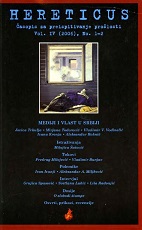Uticaj žute štampe na radikalizaciju političke scene Srbije
Influence of Tabloids on the Radicalisation of the Political Scene of Serbia
Author(s): Aleksandar RoknićSubject(s): Politics / Political Sciences
Published by: Centar za unapređivanje pravnih studija
Keywords: media in Serbia; tabloids; sensationalist press; parties; government; democracy
Summary/Abstract: In this article the author starts from the difference between tabloids and sensationalist press. Tabloids are different from the sensationalist press by format since they come in bigger format, but also in regard to the field of interest. They are mainly targeted at show business with very little focus on politics. The working principle of a successful sensationalist journal is that it must respect the main principles of profession of journalism. In the Milosevic era there were sensationalist newspapers which were financed by the state or parties in power. The first private daily sensationalist newspaper in Serbia was "Daily Telegraph" established in 1996. In the period after the establishment of the first democratic government in Serbia, in February 2001, there was a massive emergence of sensationalist press. The following journals were established: "Balkan" (ceased to circulate in meantime), "Kurir", "Nacional", "Exclusive", "Scandal", "Centre". "Blic" and "Vecernje Novosti" representing "serious" sensationalist newspaper are in circulation for a long time. "Politika" and "Danas" are the only serious daily newspapers in Belgrade, while the number of weekly magazines is slightly bigger. By rule, in terms of political affiliation, the sensationalist press in Serbia are right or extreme right. The political affiliation is clear - Radicals or governing Democratic Party of Serbia. The reality in the sensationalist press has the effect of contorted mirror. Since it happens very frequently that the sensationalist press by its texts and insulting titles commits different criminal offences without any reaction from the prosecution, the author concludes that the nationalist press has the support of official state authorities for this manner of communicating with the public.
Journal: HERETICUS - Časopis za preispitivanje prošlosti
- Issue Year: 2006
- Issue No: 1-2
- Page Range: 88-94
- Page Count: 7
- Language: Serbian

